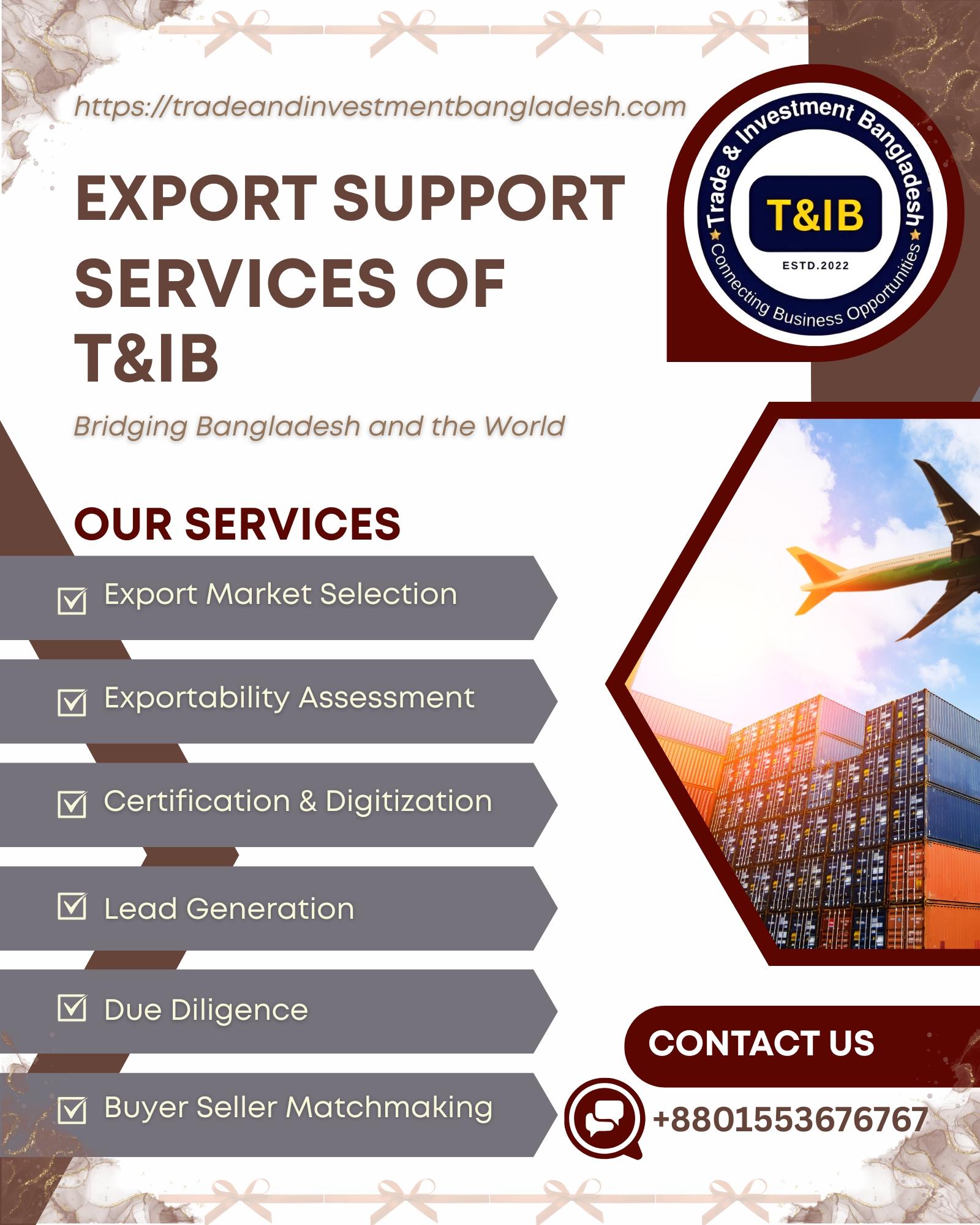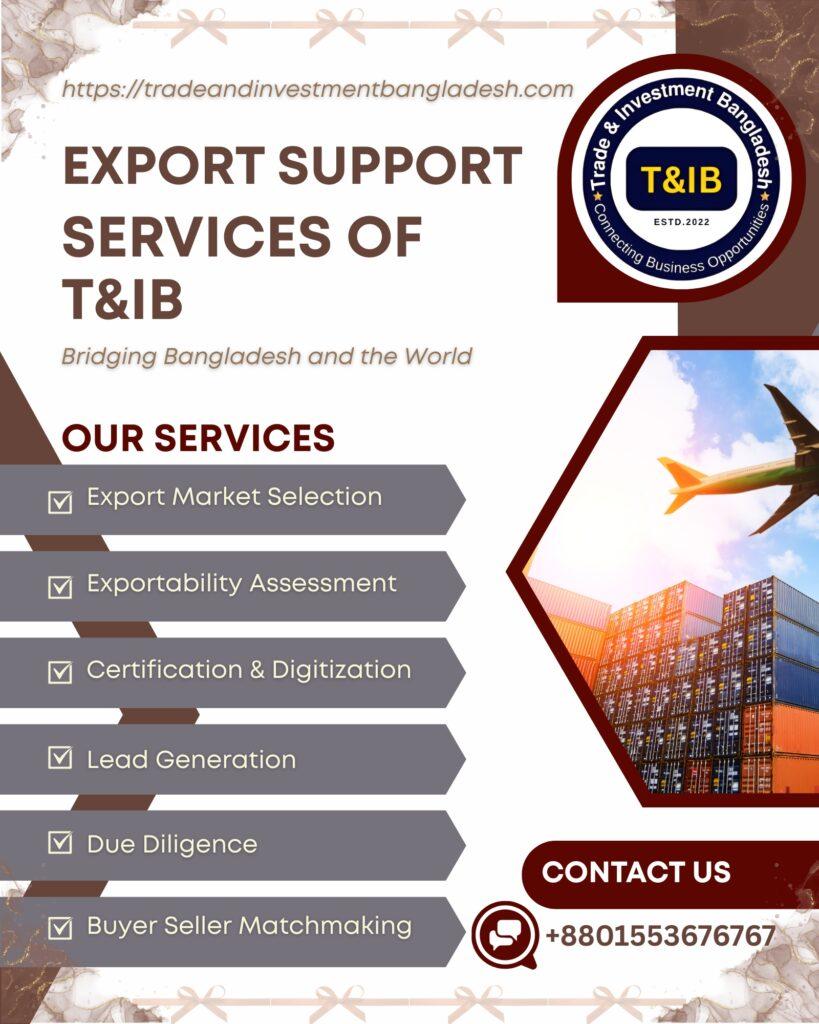Trade & Investment Opportunities between Bangladesh & Brazil
Founder & CEO, Trade & Investment Bangladesh (T&IB)
Executive Director, Online Training Academy (OTA)
Secretary General, Brazil Bangladesh Chamber of Commerce & Industry (BBCCI)
The diplomatic relationship between Brazil and Bangladesh has steadily evolved since its formal establishment in 1972, just after Bangladesh’s independence. Over the decades, both nations have maintained warm bilateral ties grounded in mutual respect, shared development goals, and growing people-to-people connections. As two major players in the Global South, Brazil, the largest economy in Latin America and Bangladesh one of the fastest-growing economies in South Asia are increasingly realizing the strategic importance of working together to advance their economic interests in a rapidly shifting global trade landscape.
In recent years, South-South cooperation has gained renewed relevance as developing countries seek to reduce dependence on traditional markets and build diversified, resilient trade partnerships. Bangladesh and Brazil embody this shift, showing increasing intent to enhance bilateral economic collaboration that aligns with their respective national priorities for sustainable development, inclusive growth, and industrial diversification.
The economic dimension of the Brazil-Bangladesh relationship has made tangible progress. According to trade data from 2023, bilateral trade exceeded USD 2.2 billion, with a steady upward trajectory. Brazil’s exports to Bangladesh primarily consist of soybeans, maize, sugar, cotton, animal feed, and iron and steel, supporting key industries such as agriculture, food processing, and textiles in Bangladesh. Meanwhile, Bangladesh’s exports to Brazil although relatively smaller in volume are gaining ground, led by ready-made garments (RMG), jute and jute goods, leather products, pharmaceuticals, and ceramics.
As the two countries seek to diversify their trade baskets and deepen private sector engagement, there lies significant untapped potential for joint ventures, investment collaboration, and technology exchange. The Made in Bangladesh Expo 2025, being held in São Paulo, Brazil, marks a pivotal step toward this vision. By showcasing Bangladesh’s manufacturing capabilities and fostering dialogue among businesses, the Expo aims to open new avenues for bilateral trade expansion, cross-border investment, and knowledge sharing.
In this context, deepening economic ties between Brazil and Bangladesh is not just timely it is essential. Both countries have much to gain from leveraging each other’s strengths: Brazil’s vast natural resources and industrial know-how, and Bangladesh’s young workforce, strategic location, and competitive manufacturing base. Together, they can chart a new course in South-South economic cooperation that is forward-looking, mutually beneficial, and globally relevant.
-
Bilateral Trade Overview
The economic relationship between Brazil and Bangladesh has experienced significant growth, with bilateral trade reaching approximately USD 2.33 billion in 2023. This marks a substantial increase from USD 1.38 billion in 2018, reflecting a robust annual growth rate of around 12.7% over the past five years.
2.1 Brazil’s Exports to Bangladesh
In 2023, Brazil exported goods worth USD 2.11 billion to Bangladesh, positioning itself as a key supplier of essential commodities. The primary exports included:
- Raw Sugar: USD 694 million
- Soybeans: USD 460 million
- Raw Cotton: USD 394 million
- Crude Soybean Oil: USD 293 million
- Cereals: USD 91 million
- Animal Feed and Residues: USD 68 million
- Iron and Steel: USD 64 million
These exports are vital for Bangladesh’s agro-processing, textile, and food industries, underscoring Brazil’s role as a strategic trade partner.
2.2 Bangladesh’s Exports to Brazil
Conversely, Bangladesh exported goods valued at USD 215 million to Brazil in 2023. The main export items were:
- Knit Sweaters: USD 43.9 million
- Non-Knit Men’s Suits: USD 32.4 million
- Non-Knit Men’s Shirts: USD 26.5 million
- Other Apparel and Textiles: USD 85.75 million
- Leather Goods: USD 4.67 million
Despite the growth in exports, Bangladesh faces challenges due to Brazil’s import tariffs ranging from 30% to 35% on ready-made garments, which hinder the competitiveness of Bangladeshi products in the Brazilian market.
2.3 Growth Trends and Trade Agreements
The trade dynamics between the two countries have shown a positive trajectory, with Brazil’s exports to Bangladesh increasing from USD 1.16 billion in 2018 to USD 2.11 billion in 2023. However, Bangladesh’s exports have seen a slight decline from USD 223 million in 2018 to USD 215 million in 2023.
To address trade imbalances and enhance economic cooperation, both nations have expressed interest in establishing a Preferential Trade Agreement (PTA). In April 2024, discussions were initiated to negotiate a MERCOSUR-Bangladesh PTA, aiming to reduce tariffs and facilitate smoother trade flows.
Additionally, the signing of the Basic Agreement on Technical Cooperation (TCA) in April 2024 signifies a commitment to leverage each other’s strengths and resources for mutual economic development.
The bilateral trade between Brazil and Bangladesh holds significant potential for growth. By addressing tariff barriers and formalizing trade agreements, both countries can foster a more balanced and mutually beneficial economic partnership. The ongoing initiatives, including the proposed PTA and technical cooperation agreements, are pivotal steps toward achieving this goal.
-
Strategic Export-Import Opportunities
The economic structures of Brazil and Bangladesh offer a naturally complementary foundation for deepening trade ties. As Bangladesh continues to grow as a manufacturing and consumer-driven economy, and Brazil maintains its global position as a resource-rich agricultural and industrial powerhouse, the scope for bilateral trade expansion is both diverse and promising.
3.1 Opportunities from Brazil to Bangladesh
Brazil supplies key inputs that fuel Bangladesh’s manufacturing and agro-industrial sectors. Agricultural commodities such as soybeans, maize, and sugar are vital for Bangladesh’s food processing and livestock industries. Raw cotton from Brazil supports Bangladesh’s globally competitive textile sector, while animal feed and soybean oil meet the demands of its growing poultry and edible oil industries. Additionally, iron and steel imports from Brazil are essential to infrastructure development and light engineering in Bangladesh, aligning with the country’s rapid urbanization and industrialization.
These commodities are not just import items they are foundational to Bangladesh’s growth sectors. Strengthening supply chains and securing long-term agreements with Brazilian suppliers can reduce sourcing volatility and enhance cost-efficiency in Bangladesh’s domestic industries.
3.2 Opportunities from Bangladesh to Brazil
On the flip side, Bangladesh presents Brazil with a growing export portfolio. As the world’s second-largest exporter of ready-made garments (RMG), Bangladesh is gradually making inroads into the Latin American market, including Brazil. Despite tariff challenges, Bangladeshi apparel—especially knitwear and woven garments—has growing appeal due to competitive pricing and quality.
Moreover, Bangladesh’s traditional strengths in jute and jute goods, leather products, and ceramics are gradually gaining traction. The country’s pharmaceutical sector, known for producing high-quality generic medicines, also holds untapped potential in meeting Brazil’s healthcare needs at competitive rates. Additionally, light engineering products, such as simple machinery parts and consumer electronics components, represent a niche area where trade can be expanded.
3.3 Sector-Specific Growth Potential
- Agro-processing & Food Security: Brazilian agricultural exports meet the rising demands of Bangladesh’s food and animal feed sectors. Investments in joint ventures for processing, cold storage, and logistics could enhance value addition and efficiency.
- Textiles & Fashion Retail: As Brazil’s middle class grows, so does its appetite for affordable fashion. Bangladeshi RMG exporters could explore joint branding ventures, warehousing facilities, and direct retail entry into Brazil’s urban centers.
- Healthcare & Pharmaceuticals: With a mature domestic pharmaceutical industry, Bangladesh is well-positioned to partner with Brazilian importers to supply essential and affordable medicines, particularly in public healthcare programs.
- Sustainable Products & Green Trade: Both countries are emphasizing sustainability. There is room to expand trade in eco-friendly jute products, recyclable textiles, and green building materials.
- Engineering & Infrastructure: Brazilian expertise in infrastructure and industrial machinery could be complemented by Bangladesh’s growing light engineering capabilities, fostering collaborations in manufacturing hubs or SEZs (Special Economic Zones).
By focusing on these strategic sectors, Brazil and Bangladesh can transform their trade relationship into a long-term economic partnership. Diversifying the trade basket, encouraging technology transfer, and promoting joint ventures will not only increase trade volumes but also create sustainable and inclusive growth for both economies.
-
Investment Collaboration and Joint Ventures
The economic landscapes of both Bangladesh and Brazil offer a wealth of opportunities for cross-border investment collaboration. Both countries, despite being on different continents, share common objectives of industrial development, job creation, and sustainable economic growth. By capitalizing on each other’s strengths and exploring joint ventures, there is immense potential for both Brazilian investment in Bangladesh and Bangladeshi investment in Brazil.
4.1 Sectors in Bangladesh Attractive for Brazilian Investors
-
Textiles and Apparel
- Bangladesh is one of the world’s largest producers of ready-made garments (RMG), and the sector continues to show growth despite global challenges. With the country’s competitive labor costs, skilled workforce, and well-established export networks, there are significant opportunities for Brazilian investors to establish textile production units, garment manufacturing, or joint ventures with local firms to increase production capacity for export to both existing and new markets.
- Bangladesh’s garment sector contributes significantly to the economy and could further benefit from Brazilian investments in sustainable textile production, leveraging eco-friendly technologies and advanced processing machinery.
-
Agro-Processing
- Bangladesh has a large agricultural base, with key exports including rice, jute, fruits, and vegetables. Brazilian investors specializing in food processing and packaging technologies can tap into the agro-industrial sector by setting up processing plants that add value to raw materials, extending shelf-life, and creating finished products for both local consumption and export markets.
- With increasing consumer demand for processed foods and ready-to-eat meals, Bangladesh’s agro-processing sector offers promising opportunities for technology integration and investment.
-
Pharmaceuticals
- Bangladesh has one of the largest generic pharmaceutical industries in the world, exporting to over 150 countries. With Brazil’s pharmaceutical market growing due to increasing healthcare demands, Brazilian investors can explore partnerships with Bangladeshi manufacturers to enter Brazil’s pharmaceutical sector, especially in affordable generics and over-the-counter medicines.
- Brazil’s well-established healthcare system and vast market for biotechnology and pharmaceuticals present opportunities for technology transfer in drug formulation and production.
-
Information and Communication Technology (ICT)
- Bangladesh has become a hub for IT outsourcing and software development, with a growing number of IT parks and a skilled, young workforce. Brazilian firms specializing in cloud computing, cybersecurity, and e-commerce solutions could tap into Bangladesh’s fast-growing ICT sector.
- Joint ventures in software development and IT-enabled services could also boost bilateral trade in the technology sector.
-
Infrastructure Development
- Bangladesh’s infrastructure needs are immense, driven by rapid urbanization and industrialization. Brazilian construction firms with expertise in large-scale infrastructure projects, including roads, bridges, and ports, can collaborate with Bangladeshi companies to execute development projects.
- Bangladesh’s power generation, water supply, and transportation sectors are key areas for Brazilian investors interested in establishing infrastructure development partnerships.
4.2 Opportunities for Bangladeshi Investment in Brazil
-
Agri-Tech
- Brazil is a global leader in agricultural innovation, with expertise in precision farming, irrigation technologies, and crop management systems. Bangladeshi firms specializing in agriculture-based industries could explore joint ventures or investments in agri-tech solutions that cater to Brazil’s demand for more efficient and sustainable farming methods.
- Investment in Brazil’s agriculture-based start-ups focused on innovative farming technologies, like drone-based monitoring or bio-based pest control, could be highly lucrative.
-
Biofuels and Renewable Energy
- Brazil is a pioneer in biofuels, particularly ethanol production from sugarcane, and is heavily invested in renewable energy. Bangladesh’s growing energy demand creates a pathway for Bangladeshi companies to invest in Brazil’s biofuel industry or collaborate on renewable energy projects.
- As Bangladesh looks to diversify its energy sources, investing in Brazil’s established renewable energy market, especially bioenergy and wind energy projects, can open up new business avenues for Bangladeshi firms.
-
Food Processing
- Brazil has a well-established food processing industry, including meat, poultry, dairy, and beverages. Bangladesh’s significant production of fruits, vegetables, and seafood could be exported to Brazil for processing. Bangladeshi investors could enter Brazil’s food processing sector by investing in meat processing plants or packaging facilities.
- The food processing market in Brazil is mature but offers growth opportunities in niche segments like Halal foods and organic products—areas where Bangladesh’s production could align with market demands.
-
Automotive Parts and Components
- Brazil is a regional leader in the automotive industry, producing vehicles and components for both domestic and export markets. Bangladesh, with its emerging automotive sector, has the opportunity to invest in Brazil’s automotive supply chain by establishing partnerships with Brazilian manufacturers.
- This investment could include setting up facilities to supply automotive parts, including engine components, battery technologies, and vehicle accessories, thus benefiting from Brazil’s vast automotive market.
4.3 Scope for Technology Transfer and Co-Production
The potential for technology transfer and co-production between Brazil and Bangladesh is vast, especially in the following sectors:
- Agri-tech and Food Processing: Brazilian agricultural technologies in precision farming and agro-processing can be introduced to Bangladesh through joint ventures, improving productivity and sustainability.
- Pharmaceuticals: Brazil’s advanced biotech research and drug development technologies could be shared with Bangladesh, enhancing its manufacturing capabilities in generics and opening up export avenues to Latin America.
- Renewable Energy and Biofuels: Brazil’s success in biofuel production and renewable energy can provide valuable knowledge transfer to Bangladesh’s energy sector, particularly in bioenergy, solar, and wind technologies.
- Infrastructure Development: Brazil’s expertise in large-scale infrastructure development, particularly in transportation and energy infrastructure, can be leveraged for co-production partnerships in Bangladesh, especially in areas where Brazil has specialized machinery and techniques.
There is immense potential for investment collaboration and joint ventures between Bangladesh and Brazil across a range of sectors. By focusing on complementary areas such as textiles, agro-processing, ICT, biofuels, and pharmaceuticals, both nations can strengthen their economic relationship and enhance their positions in the global marketplace. Technology transfer, particularly in renewable energy, agriculture, and manufacturing, will be crucial for fostering long-term, sustainable growth and making this partnership a model for South-South cooperation.
-
Institutional Support and Policy Framework
To foster robust bilateral trade and investment between Bangladesh and Brazil, institutional support and a conducive policy framework are essential. Government bodies, chambers of commerce, trade promotion agencies, and policy instruments such as Preferential Trade Agreements (PTAs) or Free Trade Agreements (FTAs) can significantly enhance the trade environment. Strengthening these institutional and policy mechanisms is crucial for overcoming existing trade barriers and unlocking new opportunities.
5.1 Role of BBCCI, Embassies, and Trade Promotion Agencies
Brazil Bangladesh Chamber of Commerce & Industry (BBCCI) plays a central role in promoting and facilitating bilateral trade between the two nations. As a bridge between the private sectors of Brazil and Bangladesh, BBCCI:
- Promotes Trade Missions and Expos: The BBCCI organizes trade missions, exhibitions, and expos (like the Made in Bangladesh Expo) to bring together businesses, industry leaders, and government officials from both countries. These events showcase products, foster networking, and explore new partnerships.
- Provides Business Intelligence: The BBCCI offers market intelligence, including trade statistics, regulatory updates, and business trends, which are invaluable for both Brazilian and Bangladeshi businesses seeking to expand in each other’s markets.
- Advocates for Policy Improvements: The chamber actively engages in advocacy to promote favorable trade policies, including lobbying for reductions in tariffs, the removal of non-tariff barriers, and the implementation of policies that facilitate smooth trade flows.
Additionally, the Embassies of Brazil in Bangladesh and Bangladesh in Brazil serve as vital facilitators of trade. They:
- Provide Diplomatic Support: Embassies help create an enabling environment by establishing diplomatic ties, signing memorandums of understanding (MOUs), and acting as intermediaries for resolving any trade-related disputes.
- Assist in Trade and Investment Promotion: They often work in tandem with trade promotion agencies such as Apex-Brazil (the Brazilian Agency for Promotion of Exports and Investments) and Bangladesh Investment Development Authority (BIDA) to create awareness about investment opportunities and market potential.
- Issue Visas and Facilitate Travel: Trade missions and visits are a key component of enhancing bilateral trade. The embassies assist in facilitating business visas and organizing events that allow companies to meet with potential partners, investors, and government representatives.
Trade Promotion Agencies in both countries are dedicated to enhancing bilateral trade relations. In Brazil, organizations like Apex-Brazil provide valuable support, such as:
- Market Research and Business Matching: Apex-Brazil conducts market research to identify new opportunities and helps connect Brazilian businesses with Bangladeshi counterparts through matchmaking services.
- Support for Exporters: Brazilian exporters receive support for navigating international markets, including guidance on regulatory requirements, trade logistics, and marketing strategies tailored to specific countries.
In Bangladesh, agencies like BIDA (Bangladesh Investment Development Authority) support investors by offering guidance on local regulations, providing investment incentives, and facilitating one-stop services for foreign investors.
5.2 Importance of Preferential Trade Agreements (PTA) or Free Trade Agreements (FTA)
A key component for enhancing trade relations between Brazil and Bangladesh is the implementation of Preferential Trade Agreements (PTAs) or Free Trade Agreements (FTAs). These agreements significantly reduce trade barriers and make the exchange of goods and services smoother and more cost-effective.
- Preferential Trade Agreements (PTA): PTAs typically allow countries to grant each other lower tariffs on certain goods or provide other advantages, such as simplified customs procedures. By entering into a PTA, both Brazil and Bangladesh can prioritize certain priority sectors such as agriculture, textiles, pharmaceuticals, and IT services which will make trade between the two countries more competitive.
- Free Trade Agreements (FTA): An FTA goes a step further by eliminating tariffs altogether and easing the movement of goods, services, and investments across borders. Establishing an FTA between Bangladesh and Brazil would provide substantial benefits in terms of market access. It would also allow Bangladeshi exporters of textiles and ready-made garments to compete more effectively in Brazil’s market, while Brazilian exporters would have easier access to Bangladesh’s growing agro-processing, pharmaceuticals, and renewable energy sectors.
- Potential Areas for Future Negotiations: For both countries, establishing FTAs or PTAs could create immense opportunities, especially in sectors like biofuels, automotive components, pharmaceuticals, and agro-products. Negotiating a Bilateral Investment Treaty (BIT) alongside a trade agreement can further solidify investment protection, helping businesses overcome perceived risks.

5.3 Need for Dedicated Trade Desks and Bilateral Chambers
In order to capitalize on the growing trade potential, there is a pressing need for dedicated trade desks and more robust bilateral chambers of commerce in both Brazil and Bangladesh.
-
Dedicated Trade Desks:
- At the Embassies: The creation of dedicated trade desks at the Brazilian Embassy in Dhaka and the Bangladeshi Embassy in Brasilia could play an important role in simplifying the process of connecting businesses from both sides. These desks would serve as the first point of contact for companies seeking information about doing business in the respective countries.
- Private Sector Support: Such desks could provide consultative services, assist in regulatory compliance, and help companies identify business partners. They could also assist in resolving logistical issues, from shipping to customs, offering a smoother entry point for investors.
-
Strengthening Bilateral Chambers:
- BBCCI’s Role: As a central player in facilitating trade, the Brazil Bangladesh Chamber of Commerce & Industry (BBCCI) can serve as an intermediary between government bodies, businesses, and investors. However, further strengthening of BBCCI’s role would be beneficial, including enhancing its resources, visibility, and ability to engage with both Brazilian and Bangladeshi companies.
- Collaboration with Other Chambers: Further collaboration between Brazilian and Bangladeshi business chambers could help to create joint ventures and business partnerships. These partnerships could not only be about trade but also about capacity building, skill development, and joint research and development (R&D) projects that target emerging sectors like sustainability and clean energy.
To successfully deepen economic ties between Bangladesh and Brazil, a robust institutional framework is essential. BBCCI, embassies, trade promotion agencies, and policy tools such as FTAs or PTAs will be instrumental in fostering a more efficient and collaborative business environment. Establishing dedicated trade desks, strengthening the role of bilateral chambers, and creating trade incentives through agreements will help unlock new growth opportunities, mitigate challenges, and ensure a strong foundation for the future of Bangladesh-Brazil economic relations.
-
The Role of Trade Fairs and Business Delegations
Trade fairs and business delegations serve as powerful tools for promoting bilateral trade, enhancing cultural understanding, and facilitating long-term economic partnerships. Events like the Made in Bangladesh Expo 2025 are pivotal in showcasing the strengths of a country’s industries and attracting international investors, trade partners, and customers. For both Bangladesh and Brazil, trade fairs and business delegations are essential in fostering connections, broadening market access, and enhancing trade and investment flows.
6.1 Importance of Expos Like Made in Bangladesh Expo 2025
The Made in Bangladesh Expo 2025, scheduled in São Paulo, Brazil, is more than just a trade event; it is an opportunity to highlight Bangladesh’s industrial capabilities, products, and services on an international platform. The expo will showcase a wide range of sectors including textiles, pharmaceuticals, agriculture, food processing, ICT, and light engineering, all of which have the potential to tap into the Brazilian market.
Here are the key roles of expos like the Made in Bangladesh Expo 2025:
- Building International Visibility: The expo provides an avenue for Bangladesh to enhance its visibility in Brazil’s growing markets. By presenting high-quality Bangladeshi products, companies can break into new markets and create long-term trade relationships.
- Showcasing Industry Strengths: Expos serve as an ideal platform for showcasing a country’s core industries. For Bangladesh, this means the opportunity to demonstrate its ready-made garments (RMG), pharmaceuticals, and agro-products while emphasizing the country’s competitive advantages, such as cost-effectiveness, skilled labor, and market proximity.
- Encouraging Investment: Beyond mere product exposure, the expo serves as a critical forum for attracting foreign direct investment (FDI). Brazilian investors can learn about investment opportunities in Bangladesh’s burgeoning infrastructure, energy, and technology sectors, while Bangladeshi businesses can explore partnerships, joint ventures, and market entry strategies for Brazil.
- Diplomatic and Trade Relations: Such events also help strengthen diplomatic ties and contribute to the broader South-South cooperation agenda. By showcasing a commitment to economic growth and bilateral trade, the expo becomes a venue for political leaders and business executives from both nations to align strategies and identify shared interests.
6.2 How Exhibitions Foster B2B Connections and Showcase Capabilities
One of the most significant benefits of trade exhibitions is their ability to facilitate business-to-business (B2B) connections. The Made in Bangladesh Expo 2025 will offer an environment where Brazilian and Bangladeshi business leaders can meet face-to-face, discuss mutual interests, and explore joint ventures. Here’s how exhibitions like this foster vital business linkages:
- Networking Opportunities: Trade fairs provide opportunities for networking with key industry players, including potential suppliers, customers, and business partners. Networking at an exhibition is not limited to casual interactions it is structured to foster formal agreements, partnerships, and collaborations. The Bangladesh Expo 2025 will be an essential space for Bangladeshi businesses to connect with Brazilian companies who might be interested in their products or services, opening the door to new market opportunities.
- Spotting Emerging Market Trends: Business delegations and exhibitors gain the opportunity to observe firsthand what Brazilian consumers and businesses are interested in. For example, Brazil’s growing demand for sustainable goods, green technologies, or affordable healthcare solutions may prompt Bangladeshi companies to tailor their offerings for the Brazilian market, leading to better-aligned products.
- Demonstrating Capabilities and Technologies: Exhibitions allow businesses to display their capabilities in an interactive way, from live product demonstrations to technology showcases. For instance, Bangladeshi textile manufacturers can present their new designs, innovative techniques, and sustainable production practices directly to Brazilian buyers. This face-to-face interaction often leads to stronger business relationships than traditional digital or written communications.
- Facilitating Trade Deals: Exhibitions also function as a direct channel for making trade deals. Businesses attending the Made in Bangladesh Expo 2025 will have the opportunity to negotiate contracts, finalize orders, and discuss distribution arrangements. This face-to-face contact is far more effective in moving beyond initial interest to actual business transactions.
- Boosting Export Competitiveness: By showcasing Bangladesh’s products in international exhibitions, such as the Made in Bangladesh Expo, the country’s exporters gain the opportunity to test and refine their product offerings based on real-time feedback from foreign customers and buyers. This helps increase competitiveness in global markets, particularly in Brazil, where product quality and innovation play a crucial role in decision-making.
6.3 Recommendations for Regular Business Forums and Cultural Exchanges
While large-scale trade exhibitions like the Made in Bangladesh Expo 2025 are immensely beneficial, they are not enough on their own to establish lasting and impactful bilateral trade relations. Regular business forums, delegations, and cultural exchanges are crucial for maintaining momentum and deepening cooperation. Here are key recommendations for enhancing such engagements:
- Regular Business Forums: Establishing periodic business forums where key stakeholders from both countries government officials, diplomats, and business leaders meet to discuss opportunities, challenges, and strategic directions is crucial. These forums could address sector-specific issues, provide policy updates, and allow for the exchange of best practices.
- Recommendation: Establish an annual or bi-annual Bangladesh-Brazil Business Forum in both countries, rotating between Dhaka and São Paulo. Such a forum would provide a structured environment for ongoing dialogue, exploring new opportunities, and fostering long-term partnerships.
2. Cultural and Educational Exchanges: Cultural diplomacy has proven to be an effective way of strengthening bilateral ties. While business activities dominate trade fairs, cultural exchanges help build trust and mutual understanding between people. Regular cultural exchanges such as art exhibitions, dance performances, culinary festivals, and educational programs can make the business relationship more human-centric, which is key for long-term collaboration.
-
- Recommendation: Organize cultural festivals featuring Bangladeshi and Brazilian heritage, food, music, and fashion in both countries. This would increase awareness of each nation’s culture, foster goodwill, and create a positive backdrop for future business ventures.
3. Trade Missions and Delegations: Regular trade missions and delegations are vital in building relationships between businesses from both sides. Sending business delegations to Brazil and vice versa allows companies to not only gain insight into the market but also understand the culture and legal framework of the other country.
-
- Recommendation: Facilitate trade delegations focused on specific sectors such as renewable energy, agriculture, textiles, and pharmaceuticals, accompanied by governmental support. Such delegations would ensure targeted engagement and increase the chances of meaningful partnerships.
4. Sector-Specific Workshops: Organizing sector-specific workshops within business forums can address the unique challenges each industry faces. These could be led by industry experts from both countries to share insights, experiences, and strategies to overcome market-entry barriers.
5. Digital Platforms for Continuous Engagement: Beyond physical trade fairs, creating digital platforms for businesses to continually engage with each other, share insights, and collaborate can sustain the momentum between expos and delegations. Virtual trade fairs, webinars, and online business matchmaking services can ensure that the connections made at events like the Made in Bangladesh Expo 2025 continue to thrive.
Trade fairs, such as the Made in Bangladesh Expo 2025, are instrumental in fostering B2B connections, showcasing the economic potential of both Bangladesh and Brazil, and deepening long-term commercial ties. These events provide invaluable networking opportunities, platform for deal-making, and a space to demonstrate the strengths of industries. However, they must be complemented by regular business forums, cultural exchanges, and trade missions that sustain and build upon the relationships initiated during such exhibitions. By enhancing and institutionalizing these mechanisms, Bangladesh and Brazil can establish a dynamic and sustainable economic partnership.

-
Recommendations for Advancing the Partnership
As Bangladesh and Brazil move toward a deeper economic partnership, it is essential to address existing challenges while building infrastructure, policy, and institutional frameworks that promote bilateral trade and investment. Despite the growing goodwill and complementary trade interests, a few structural and operational gaps hinder the full realization of the economic potential between these two emerging economies. The following recommendations aim to tackle these issues and unlock greater collaboration.
7.1 Enhance Logistics and Shipping Links
One of the most critical impediments to bilateral trade is the lack of direct and efficient logistics and shipping routes between Bangladesh and Brazil. Currently, most goods are routed through third countries or transshipment hubs, leading to increased costs, delayed deliveries, and uncertainty in supply chains.
Recommendations:
- Establish Direct Maritime and Air Cargo Routes: Governments and private sector stakeholders should explore the viability of establishing direct shipping routes or cargo flights between key ports like Chattogram Port and Santos Port, or Dhaka Airport and São Paulo Airport, to reduce transit times and improve logistics reliability.
- Promote Logistics Partnerships: Encourage collaboration between logistics providers in both countries. Joint ventures in shipping, warehousing, and customs clearance could reduce dependency on intermediary countries and cut costs.
- Utilize Regional Trade Corridors: Brazil’s growing trade with Asia and Bangladesh’s strategic location as a gateway to South and Southeast Asia can be leveraged to develop regional trade corridors that benefit both countries.
7.2 Reduce Non-Tariff Barriers (NTBs)
While tariff rates often capture the most attention, non-tariff barriers—such as complicated customs procedures, inconsistent standards, and bureaucratic hurdles—can be just as obstructive to smooth trade.
Recommendations:
- Harmonize Standards and Certifications: Develop a mutual recognition framework for product standards, testing, and certification in key sectors like pharmaceuticals, textiles, and agro-products to reduce rejection of goods due to regulatory discrepancies.
- Simplify Customs Procedures: Encourage digitalization and streamlining of customs and inspection procedures. Bilateral agreements for advance rulings, single window systems, and electronic documentation can enhance trade efficiency.
- Create a Bilateral NTB Taskforce: Form a permanent body under the Bangladesh-Brazil Joint Economic Commission to identify, document, and resolve non-tariff barriers as they arise, promoting transparency and timely resolution.
7.3 Facilitate Visa and Work Permits for Businesspersons
Ease of movement is a fundamental requirement for fostering meaningful economic partnerships. The absence of streamlined visa policies and work permit systems often discourages potential investors and business operators from initiating or expanding cross-border operations.
Recommendations:
- Business-Friendly Visa Regimes: Implement multiple-entry business visas for approved companies, chamber members, and participants in official trade delegations. These could be valid for one to five years and offer simplified documentation requirements.
- Fast-Track Processing for Trade Delegations: Establish special visa desks or “fast lanes” within embassies and consulates for registered participants in trade fairs, business forums, and delegations like those attending the Made in Bangladesh Expo.
- Introduce Work Visa Pathways: Develop transparent and efficient work visa categories for Brazilian and Bangladeshi entrepreneurs and professionals interested in operating businesses or joint ventures in each other’s countries.
- Consular Collaboration: Strengthen coordination between the Brazilian and Bangladeshi embassies to ensure consistent and timely visa processing, backed by a dedicated support team for business visitors.
7.4 Strengthen Banking and Remittance Channels for Smoother Transactions
Efficient financial infrastructure is essential to facilitate cross-border transactions, reduce risks, and build trust between trading partners. Currently, both remittance processing and banking connectivity between Bangladesh and Brazil remain underdeveloped.
Recommendations:
- Promote Banking Correspondence: Encourage major banks in Bangladesh and Brazil to establish correspondent banking relationships, enabling faster, cheaper, and more reliable trade finance and payment settlements.
- Digital Payment Integration: Explore the development of digital cross-border payment solutions and remittance platforms, potentially through fintech collaboration, to assist SMEs and individuals engaging in bilateral trade.
- Currency Settlement Mechanisms: Consider setting up a framework for local currency trade settlements (e.g., BDT and BRL) or using a third-party reserve currency like USD more efficiently, with safeguards to mitigate currency fluctuation risks.
- Joint Venture Financial Institutions: Encourage the formation of joint-venture financial institutions or credit facilities that support bilateral trade and investment projects, particularly in sectors like textiles, agro-processing, and infrastructure.
To fully realize the potential of the Bangladesh–Brazil partnership, practical improvements in logistics, regulatory frameworks, mobility of businesspersons, and financial transactions must be prioritized. These steps, if implemented with commitment and collaboration, will not only reduce operational barriers but also create a more attractive and stable business environment. As both countries continue to explore deeper cooperation through events like the Made in Bangladesh Expo 2025, these strategic recommendations offer a roadmap for strengthening economic ties and advancing mutual prosperity.

-
Conclusion: Building a Sustainable Future Together
As Brazil and Bangladesh stand at the crossroads of global economic transformation, the foundation for a strong and mutually beneficial partnership has never been more promising. With bilateral trade crossing USD 2.2 billion in 2023, and growing at a steady pace, both nations have demonstrated the potential to complement each other’s economic strengths. Bangladesh’s dynamic manufacturing base, especially in ready-made garments, pharmaceuticals, and ceramics, aligns seamlessly with Brazil’s resource-rich exports in soybeans, cotton, sugar, and iron, laying the groundwork for a resilient and diversified trade relationship.
To realize this vision, coordinated action is essential. Governments must work toward reducing trade barriers, improving logistics, and exploring frameworks such as Preferential Trade Agreements (PTAs). The private sector must leverage opportunities in joint ventures, technology transfer, and investment in key areas like ICT, agro-processing, and infrastructure. Institutions like the Brazil Bangladesh Chamber of Commerce & Industry (BBCCI), along with embassies and trade councils, should continue facilitating dialogue, capacity building, and business matchmaking to ensure continuous momentum.
Together, Brazil and Bangladesh can build a sustainable, inclusive, and future-ready economic alliance anchored in South-South cooperation, shared prosperity, and global competitiveness. The Made in Bangladesh Expo 2025 marks a significant step forward, but it must be followed by sustained engagement and a shared vision. By strengthening economic diplomacy and harnessing mutual strengths, the two nations can pave the way for a long-term partnership that benefits businesses, communities, and future generations.




